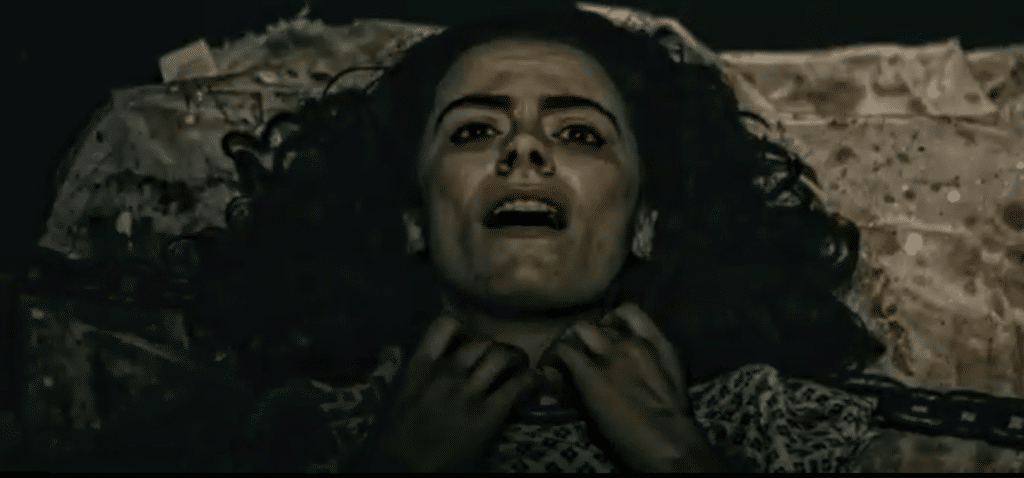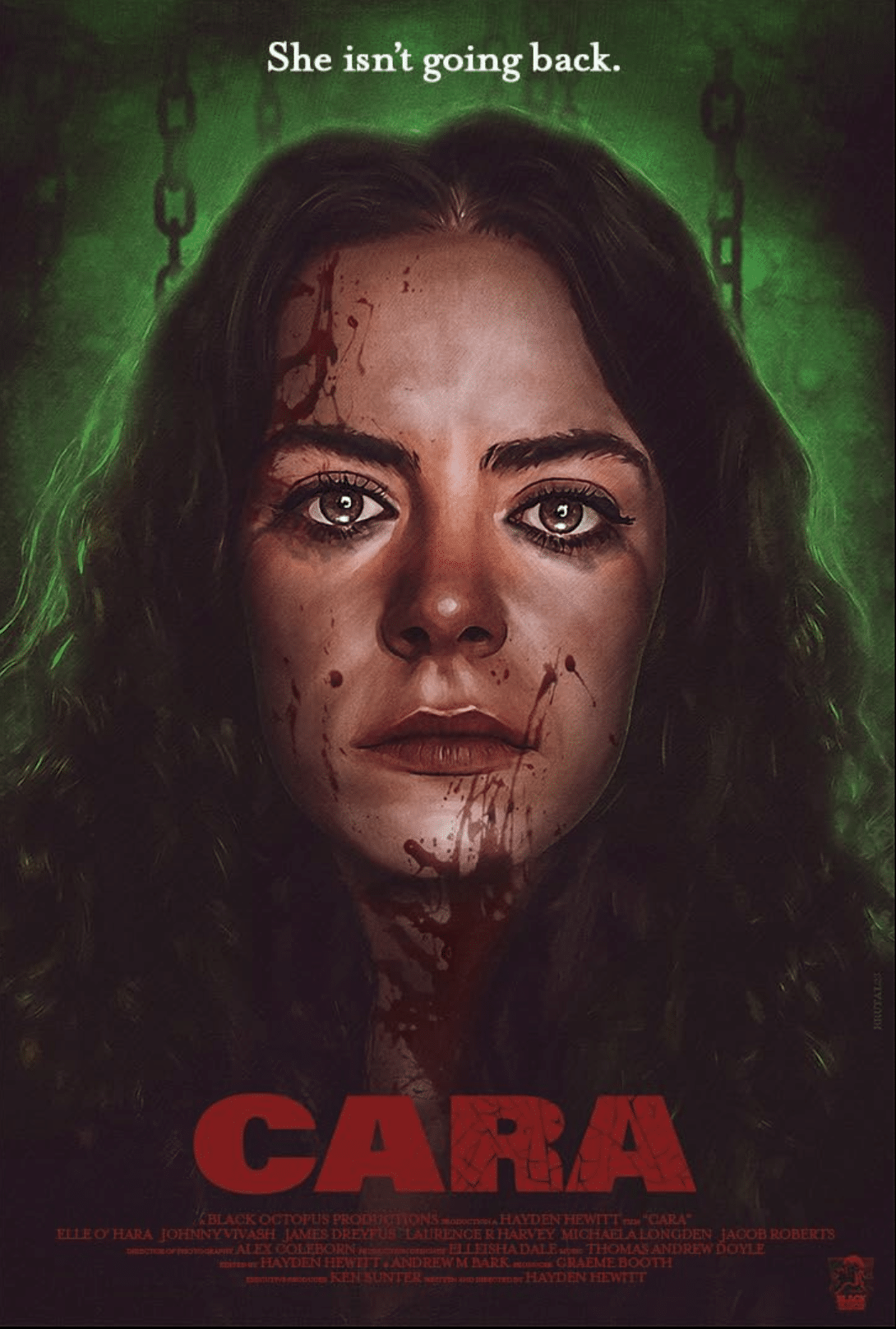
“Take your chances – you don’t get many.”
How far can a person be pushed before they finally, irrevocably snap? It’s a question horror cinema has seemingly enjoyed mulling over for as long as it’s existed, pushing for ever more disturbing conclusions as the decades pass. And, as the intense focus on distressed and vulnerable individuals has increased, so the resolutions themselves have become more shocking, often drawing upon dream states, psychosis and burgeoning violence before drawing to a close. Recent films which have done just this include Saint Maud, Stopmotion and Censor – female-focused stories where the desire to just get on, to live, soon curdles into something unreasonable and unstoppable. But yet, in all of these stories, the female protagonist at least has a brief moment in the sun – a reason to hope – before things come crashing down. A new career, a new creative pursuit – something. There’s some worthy attempt to escape one’s demons, even if ultimately, this fails.
Cara (2024) in many respects belongs to the above group, but with an important proviso: from the first moments we meet Cara (Elle O’Hara) it’s clear that the ground beneath her feet has already started to slip, if she ever held any purchase on it whatsoever. The world she’s managed to build for herself is either dismissive of her, or openly hostile; she has little worth, or is barely understood. The big crisis – and the film feels full of emerging crises, long before they become clearer – already feels like it’s on its way, even by the time the opening credits roll; all we can do is observe what happens. Doomed to repeat old cycles, any grab for agency on Cara’s part is – in the true sense of the world – problematic. But Cara is, in many respects, agreeable and likeable – you want her to thrive, to have something good in her life. She’s no sacrificial lamb; this isn’t that type of film. As a result, Cara is singularly hard-hitting, and the more you think over its core elements (and you will), the bleaker and crueller it all seems.
The film opens with an array of pixelated male faces and certain close shots of our lead which quickly reveal that she is a cam girl, but not for your standard turn-up-and-stare channels; things are darker here, as she broadcasts on a site called RedRoomFans which demands a bit more – specialist entertainment for its punters, shall we say. Both Cara and her flatmate Ash (Michaela Longden) work in this potentially rather shady trade, but Ash doesn’t participate in the more niche stuff. That being said, neither of them are exactly rolling in money through their endeavours. Ash refers to it as “a marathon, not a sprint”: it’s just another version of hard graft, and just as thankless. Outside of her online sessions, Cara is in therapy: all of her reality seems to be refracted through technology, laptop or phone, but in that she’s not so unusual, and she is working hard to compartmentalise her life – therapy sessions, cam sessions – all by interacting with her mobile or computer. Overshadowing all of this is her shaky ‘recovery’, and her certainty that she is about to be returned to hospital. We can insinuate that she means a mental hospital; is her fear of this triggering her current mindset?
We see Cara begin to disassociate from reality rather frequently, hearing people say things about her which clearly reflect her deepest feelings of shame and revulsion; they’re not really saying it, but again, there’s that sense of slipping down, down, down. Demands on her time by a client from the website, who apparently has enough knowledge about her to intimidate and bully her, push her further. So, when a fellow recovery group member casually mentions that he’d have once used violence on the therapy group leader for her belittling language towards him, it’s as if Cara grabs onto that possibility – of using violence to reset the balance. As the steady, certain erosion of hope continues around her, she begins to channel her hopelessness into defiance, forging ahead with a bizarre plan which she believes will change all the equations.
Cara takes place on the fringes of the everyday world, but it’s nonetheless a recognisable place, one where women are not seen as fully human beings. We know it goes on; we may see it for ourselves; here it feels particularly brutal, though, because Cara is a vulnerable woman struggling so hard to get control, but she’s already reduced in the eyes of many by her sexuality – and she feels, or has felt, that she has little option but to operate in that world, too – the spectre of abuse is never far away here. With a limited hand to play, one coloured by her past and her experiences, she has thrown in her lot with people and situations which could only ever do her harm in the long run. Her dawning awareness of this, and her determination to fight back, are understandable, even if her methods are – shall we say, questionable? But because Cara is a character with real depth, the film avoids playing her as a pawn, and clearly never sets out to do so: it would be a real mistake to fail to see past the film’s more horrifying or exploitative context, because it has some real clout in how it explores its key bigger-picture themes: power and powerlessness. Its array of nasty or damaged people, grim places and transactional relationships all point towards the balance of power, and how limited power in society is carved up and distributed.
The chief style of horror in Cara – despite a few shocking, appalling moments of bloodshed – is psychological, interweaving fantasy, dreams and persecution mania into its story. It’s a singularly unpleasant experience, but a strangely mesmerising one, with a sharp British script (and plenty of British invective) plus a cast giving high quality, invested performances throughout. There’s even the odd moment of dark humour – but don’t get your hopes up. You’re not lifted out of the hideousness of human cruelty and hypocrisy for very long. In fact, the more I think about Cara, the more I’m impressed that a film with a limited budget, small cast and on first pass, seemingly recognisable plot elements could combine into something so monumentally unpleasant and unsparing. Some time after my initial viewing, I’m still pondering what I’ve seen: is anything as it seems? Nothing is true; everything is permitted?
Audiences will differ, and this is also to the film’s credit. Cara leaves you with a sense of deep unease, and it sticks around, too, kicking up the odd moment of crushing realisation, or the answer to a question you wish you’d never asked.
Cara (2024) received its premiere at this year’s FrightFest. The film now has a release date of 3rd Feb 2025 from Reel 2 Reel Films.
